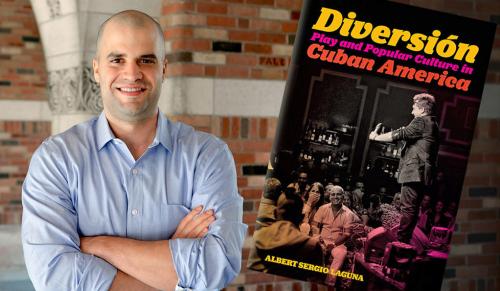
Yale News explores Yale Scholar as he Cuban-American life through lens of popular culture
There was a time when Albert Laguna thought his father was the funniest man in the world. Until, that is, he began to research the topic of popular culture in Cuba for his recently published book and realized that his father had been stealing quite a few of his jokes from the popular Cuban comedian Guillermo Alvarez Guedes.
Famous for his one-liners, Alvarez Guedes released over 32 joke albums, and made appearances on television, in movies and on radio. Despite the fact that the comedian has permeated Cuban American culture, “no one has ever written about his social importance and the consequences of his work,” says Laguna, adding that it the first thing he thought of when reading scholarship on Cuban Americans. “Cuban American studies has mostly focused on the pain of exile, but then you have this comedian who is the soundtrack for the quotidian life of so many. Everyone knows him. Cubans grows up listening to his albums at home, and people — including my own father — retell his jokes constantly.”
It was this comedian, and the topic of comedy and popular culture in Cuban America more broadly, that became the cornerstone for Laguna’s recently published book, “Diversión: Play and Popular Culture in Cuban America.”
Laguna, assistant professor of American Studies and Ethnicity, Race & Migration, used the stand-up comedy of Alvarez Guedes and other forms of comic popular culture to weave a story about the cultural, political, and even economic complexity of Cuban life in the United States. “It is also through humor that you can understand racial tensions in Miami between Cubans and African Americans, discrimination faced by Cuban Americans, and ties between Cubans on and off the island,” says Laguna. “Comedy is a complex site for understanding a range of social relations.”
This book, says Laguna, “asks the reader to slow down and think about the quotidian cultural consumption that frames their lives but that they don’t necessarily think about.” In a chapter about the internet, Laguna uses viral videos and memes to tell a story about generational tensions within the Cuban community as well as about connections between the island and the United States. “These very simple cultural moments that we take for granted actually can be unpacked to do important historical, social, and cultural work,” he notes.
Laguna, who teaches a course titled “History and Culture of Cuba” as well as courses in race and ethnic studies, explains that the study of popular culture can play an important role in enhancing a student’s education.
for the complete article please visit: Yale News.
